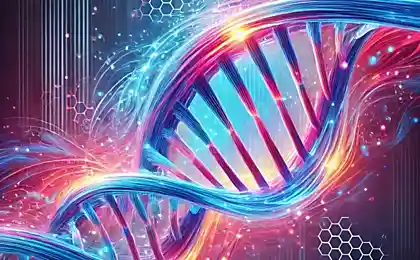578
Children inherit intelligence through the maternal line
The results of scientific research suggests that the level of human intelligence is mainly determined by maternal, not paternal genes. This means that in order to give birth to a smart baby, it is not necessary to "hunt" for Nobel laureates.
Mothers more likely to inherit genes for mental ability, as these genes are sex-linked X chromosome, which women are represented in two copies, while males in the same, writes The Independent.
Moreover, as the researchers suggest, based on the latest scientific data, "smart" genes derived from the father, can in offspring is automatically deactivated.
The fact that the genes for intelligence are genes that are controlled floors that behave differently depending on their origin. Some are active only if they are inherited from the father, some only if they are inherited from the mother.
"Intelligent" genes are just the latest varieties.

As shown by the research conducted on genetically modified mice, in individuals with excess dose of maternal genes grows a big brain, and the body is poorly developed. Conversely, in mice with paternal genes over the body grows large, and the brain remains small.
Studying the distribution of cells containing only maternal only paternal genes in the brain of mice, scientists have found that cells with paternal genes prevail in the ancient limbic system of the brain and are responsible for such basic things as sex, food and aggression. At the same time, no "paternal" cells were not found in the cerebral cortex, responsible for advanced cognitive functions – thinking, language, memory, planning their actions.
The fact that these data are correct and people have confirmed the researchers from the University of Glasgow (UK). They every year since 1994, tested mental abilities of almost 13 thousand young people aged 14 to 22 years. The analysis showed that even taking into account many factors, from educational level to socioeconomic status of study participants, rather only to predict their intellectual level by IQ level of their mothers.

At the same time, science suggests that mental abilities are determined by heredity only 40-60%. Everything else associated with the external environment in which growing and developing person, but this part of the contribution to the child's intelligence to a great extent depends on the mother.
According to researchers from the University of Washington (USA), it is the close emotional bond between mother and child is a key factor for the normal development of certain areas of his brain. The researchers analyzed how a group of mothers talk with their children for seven years after their birth.
It was found that children treated with good emotional and intellectual support from mothers at the age of 13 years, the size of the hippocampus – a brain area associated with memory, learning and stress response, was 10% more than those children whose mothers were kept at a distance.
Lyudmila Petranovskaya: Most theories of education.
12 reminders for parents from Shalva Amonashvili
A strong bond with the mother provides the child a sense of security and gives you freedom to explore the world, scientists say. Loyal, attentive mother helps the child to overcome all difficulties and achieve their potential. At the same time, fathers also do not despair – they pass on to their children and using the genes and participating in their education, and many other important attributes that help the development not only of intellect, but of the whole person.published
Source: deti.mail.ru/news/deti-nasleduyut-svoj-um-ot-mam/?from=newsapp
Mothers more likely to inherit genes for mental ability, as these genes are sex-linked X chromosome, which women are represented in two copies, while males in the same, writes The Independent.
Moreover, as the researchers suggest, based on the latest scientific data, "smart" genes derived from the father, can in offspring is automatically deactivated.
The fact that the genes for intelligence are genes that are controlled floors that behave differently depending on their origin. Some are active only if they are inherited from the father, some only if they are inherited from the mother.
"Intelligent" genes are just the latest varieties.

As shown by the research conducted on genetically modified mice, in individuals with excess dose of maternal genes grows a big brain, and the body is poorly developed. Conversely, in mice with paternal genes over the body grows large, and the brain remains small.
Studying the distribution of cells containing only maternal only paternal genes in the brain of mice, scientists have found that cells with paternal genes prevail in the ancient limbic system of the brain and are responsible for such basic things as sex, food and aggression. At the same time, no "paternal" cells were not found in the cerebral cortex, responsible for advanced cognitive functions – thinking, language, memory, planning their actions.
The fact that these data are correct and people have confirmed the researchers from the University of Glasgow (UK). They every year since 1994, tested mental abilities of almost 13 thousand young people aged 14 to 22 years. The analysis showed that even taking into account many factors, from educational level to socioeconomic status of study participants, rather only to predict their intellectual level by IQ level of their mothers.

At the same time, science suggests that mental abilities are determined by heredity only 40-60%. Everything else associated with the external environment in which growing and developing person, but this part of the contribution to the child's intelligence to a great extent depends on the mother.
According to researchers from the University of Washington (USA), it is the close emotional bond between mother and child is a key factor for the normal development of certain areas of his brain. The researchers analyzed how a group of mothers talk with their children for seven years after their birth.
It was found that children treated with good emotional and intellectual support from mothers at the age of 13 years, the size of the hippocampus – a brain area associated with memory, learning and stress response, was 10% more than those children whose mothers were kept at a distance.
Lyudmila Petranovskaya: Most theories of education.
12 reminders for parents from Shalva Amonashvili
A strong bond with the mother provides the child a sense of security and gives you freedom to explore the world, scientists say. Loyal, attentive mother helps the child to overcome all difficulties and achieve their potential. At the same time, fathers also do not despair – they pass on to their children and using the genes and participating in their education, and many other important attributes that help the development not only of intellect, but of the whole person.published
Source: deti.mail.ru/news/deti-nasleduyut-svoj-um-ot-mam/?from=newsapp























